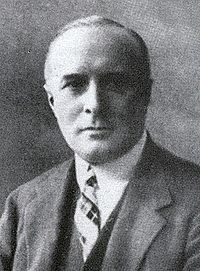
Republic of Poland Ambassador to the United Kingdom
Encyclopedia
The first permanent Polish diplomatic mission was created in late 18th century by the last king of Poland, Stanisław August Poniatowski. After partitions of Poland
, there was over a century gap in diplomatic relations. The mission was reestablished following Poland regaining independence
in the aftermath of World War I
.
This is the list of Ambassadors of Poland to the United Kingdom
_polish_diplomat.jpg)


Partitions of Poland
The Partitions of Poland or Partitions of the Polish–Lithuanian Commonwealth took place in the second half of the 18th century and ended the existence of the Polish–Lithuanian Commonwealth, resulting in the elimination of sovereign Poland for 123 years...
, there was over a century gap in diplomatic relations. The mission was reestablished following Poland regaining independence
Second Polish Republic
The Second Polish Republic, Second Commonwealth of Poland or interwar Poland refers to Poland between the two world wars; a period in Polish history in which Poland was restored as an independent state. Officially known as the Republic of Poland or the Commonwealth of Poland , the Polish state was...
in the aftermath of World War I
Aftermath of World War I
The fighting in World War I ended in western Europe when the Armistice took effect at 11:00 am GMT on November 11, 1918, and in eastern Europe by the early 1920s. During and in the aftermath of the war the political, cultural, and social order was drastically changed in Europe, Asia and Africa,...
.
This is the list of Ambassadors of Poland to the United Kingdom
Ambassadors of Poland to the United Kingdom
_polish_diplomat.jpg)


Polish-Lithuanian Commonwealth
- 1553 Thomas Stafford
- 1763 Józef Poniński
- 1766–1768 Charles Lee (nieoficjalny agent Stanisława Augusta)
- 1769–1772 Tadeusz Burzyński
- 1772–1785 Franciszek BukatyFranciszek BukatyFranciszek Bukaty was a polish diplomat.He was polish chargé d'affaires, and later ambassador in London.At first the Polish King Stanisław August Poniatowski wanted to make an English lawyer John Lind Polish ambassador in London, but British authorities opposed, because it was seen as ...
- Note: Military Partitions of PolandPartitions of PolandThe Partitions of Poland or Partitions of the Polish–Lithuanian Commonwealth took place in the second half of the 18th century and ended the existence of the Polish–Lithuanian Commonwealth, resulting in the elimination of sovereign Poland for 123 years...
ended the existence of a sovereign Polish state for over a century.
Second Polish Republic
- Note: Second Republic was created in 1918.
- 1918–1919 Władysław Sobański (Delegat Komitetu Narodowego Polskiego)
- 1919–1920 Eustachy SapiehaEustachy SapiehaEustachy Kajetan Sapieha was a Polish nobleman, prince of the Sapieha family, politician, Polish Minister of Foreign Affairs, and deputy to the Polish parliament ....
(Poseł) - 1920–1921 Jan Ciechanowski (Chargé d'Affaires a.i.)
- 1921–1922 Władysław Wróblewski (Poseł)
- 1922–1929 Konstanty SkirmuntKonstanty SkirmuntKonstanty Skirmunt was a Polish politician. Prior to 1914 he was elected to the State Council of Imperial Russia. He was a member of the Polish National Committee in Paris in 1917–1918, Polish ambassador in Rome in 1919–1921, Polish Minister of Foreign Affairs in 1921–22, and Polish ambassador in...
(Poseł) - 1929–1934 Konstanty SkirmuntKonstanty SkirmuntKonstanty Skirmunt was a Polish politician. Prior to 1914 he was elected to the State Council of Imperial Russia. He was a member of the Polish National Committee in Paris in 1917–1918, Polish ambassador in Rome in 1919–1921, Polish Minister of Foreign Affairs in 1921–22, and Polish ambassador in...
(Ambasador) - 1934–1945 Edward Raczyński
- Note: Edward Raczyński was the ambassador of the Polish government-in-exile to United Kingdom from 1939 till 1945.
People's Republic of Poland
- Note: Officially, People's Republic of PolandPeople's Republic of PolandThe People's Republic of Poland was the official name of Poland from 1952 to 1990. Although the Soviet Union took control of the country immediately after the liberation from Nazi Germany in 1944, the name of the state was not changed until eight years later...
is the name used since 1952. Unofficially, this name is used for all Polish communist governments since 1944.- 1945–1949 Henryk Strasburger
- 1949–1953 Jerzy Michałowski
- 1953–1956 Eugeniusz Milnikiel
- 1960–1964 Witold RodzińskiWitold RodzińskiWitold Rodziński was a Polish historian, sinologist and diplomat.He was born in 1918 in Lviv, son of the renowned conductor Artur Rodziński...
- 1964–1969 Jerzy Morawski
- 1969–1972 Marian Dobrosielski
- 1972–1978 Artur Starewicz
- 1978–1983 Jan Bisztyga
- 1987–1990 Zbigniew Gertych
Third Polish Republic
- Note: modern Poland.
- 1990–1993 Tadeusz de Virion
- 1994–1999 Ryszard Stemplowski
- 1999–2004 Stanisław Komorowski
- 2004–2006 Zbigniew Matuszewski
- from 2006 Barbara Tuge-ErecińskaBarbara Tuge-ErecinskaBarbara Krystyna Tuge-Erecińska is the Ambassador of the Republic of Poland to the United Kingdom, appointed by President Lech Kaczyński on 24 October 2006....
(current)
See also
- List of Ambassadors from the United Kingdom to Poland
- Poland–United Kingdom relations

